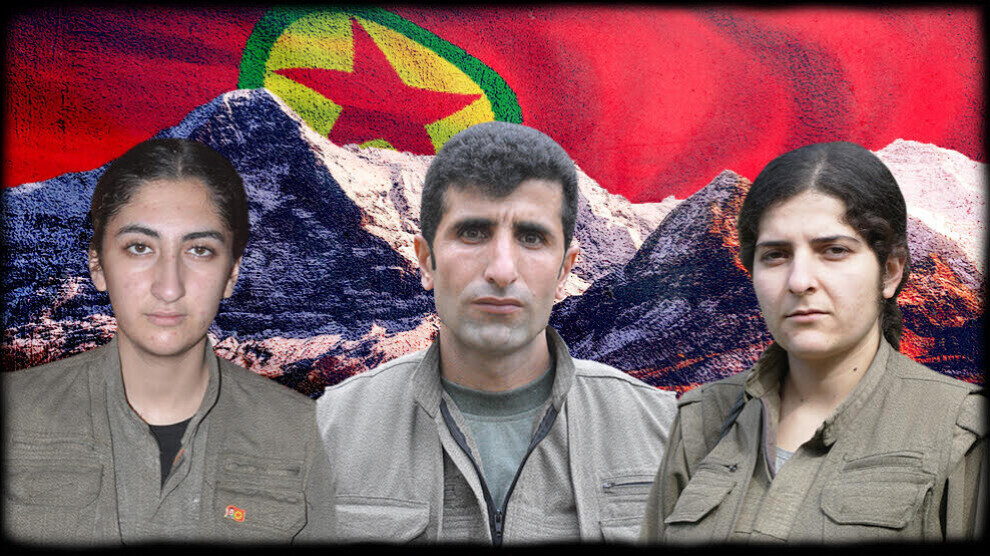HPG publishes identities of three guerrillas martyred in Turkish chemical attack
Three guerrilla fighters were killed by a Turkish chemical weapons attack on September 3. HPG published the identities of the three guerrillas martyred in Avaşîn.
Three guerrilla fighters were killed by a Turkish chemical weapons attack on September 3. HPG published the identities of the three guerrillas martyred in Avaşîn.

Three guerrilla fighters were martyred in a Turkish chemical weapons attack on the Girê Sor resistance area in the Avaşîn region of Medya Defense Zones in South Kurdistan on September 3. The Turkish army is trying to kill the fighters in the war tunnels in the Medya Defense Zones in this way and has used chemical weapons 157 times in the past month alone in South Kurdistan to break the guerrilla resistance. The statement by the press center of the People's Defense Forces (HPG-BIM) said: "Our companions Botan, Zinarîn and Delal, who opened a new chapter in the history of our people's struggle for freedom with their epic resistance in the Girê Sor resistance area, will remain in the memory of the freedom guerrillas as a great source of morale and strength and will be the cause for the progress of our struggle."
The ID details of the three fallen guerrillas are as follows:
 |
Nom de Guerre: Botan Özgür First-Last Name: Celal Özcan Birthplace: Van Mother's-Father's Name: Sadiya – Kemal Date and Place of Martyrdom: 3 September 2021 / Avaşîn |
 |
Nom de Guerre: Zinarîn Welat First-Last Name: Rama Şemdîn Birthplace: Hesekê Mother's-Father's Name: Aklima – Serbest Date and Place of Martyrdom: 3 September 2021 / Avaşîn |
 |
Nom de Guerre: Delal Qamişlo First-Last Name: Hîva Mamo Birthplace: Qamişlo Mother's-Father's Name: Hamide – Ismail Date and Place of Martyrdom: 3 September 2021 / Avaşîn |
Botan Özgür came from the Başkale district of Van province. His family was influenced by Kurdish culture and resistance. Özgür felt great interest in the Kurdish freedom struggle from a young age. He participated in the revolutionary works from 2004 and joined the guerrillas in 2012. He was in the challenging Zagros region as a fighter for a long time. He then fought in the Avaşîn region for seven years. He led a number of actions against the Turkish army and most recently played an important role in the Girê Sor resistance area. Although he was injured, he did not retreat from the front and fell as a result of a chemical weapons attack by the Turkish army. "The life and struggle of Heval Botan will always enlighten our way," HPG said.
Zinarîn Welat came from Hesekê in northeastern Syria and was involved in the Rojava revolution from the beginning. She learned about the struggle for freedom early on through her politically committed family and initially worked in the arts and culture sector. There she also became involved with the radical democratic and women's liberation ideology of the Kurdish movement and decided to join the guerrillas. She realized this desire in 2013 and went to Avaşîn. Zinarîn was strongly committed to the women's struggle and was always determined to develop the leadership role of women in this struggle. She soon became a commander. In Avaşîn, she participated in many actions against the Turkish army. "As one of the pioneers of the strong resistance of the free Kurdish women against the invading forces in the Girê Sor resistance area, she became an embodiment of Rêber Apo's [Leader Abdullah Öcalan] philosophy and a symbol of an exemplary militant attitude. Her unyielding struggle against all war technology and the use of chemical weapons will always take her place in the history of our people's resistance,” HPG said.
Delal Qamişlo came from the city of Qamişlo in Rojava and grew up with the revolution. She fought against ISIS and participated in the offensives to liberate Rojava. Through her exposure to Apoist philosophy and women's liberation, she came to the decision to join the guerrillas. She also fought in the Avaşîn region and participated in many successful actions. The HPG stated, "The line of resistance of our comrade Delal, who fell due to a chemical weapons attack by the Turkish state, will be followed by us until victory."
HPG expressed their condolences to the families of the martyrs and the Kurdish people and reaffirmed their promise to realize the martyrs’ dreams of "the freedom of Rêber Apo and of Kurdistan."